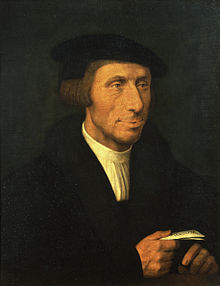
Back توماس لينيكر Arabic توماس لينيكر ARZ Thomas Linacre Czech Thomas Linacre German Τόμας Λίνακερ Greek Thomas Linacre Esperanto Thomas Linacre Spanish Thomas Linacre French Thomas Linacre Irish Thomas Linacre Italian
Thomas Linacre | |
|---|---|
 A likely portrait of Thomas Linacre | |
| Born | c. 1460 |
| Died | 20 October 1524 (aged 63–64) |
| Nationality | English |
| Other names | Lynaker |
| Occupation(s) | humanist scholar, physician, clergyman |
Thomas Linacre or Lynaker (/ˈlɪnəkər/ LIN-ə-kər; c. 1460 – 20 October 1524) was an English humanist scholar and physician, after whom Linacre College, Oxford, and Linacre House, a boys' boarding house at The King's School, Canterbury, were named.[1][2]
Linacre was more of a scholar than a scientific investigator. It is difficult to judge his practical skill in his profession, but it was highly esteemed in his own day. He took no part in political or theological questions, but his career as a scholar was characteristic of the critical period in the history of learning through which he lived.[3]
He was one of the first Englishmen to study Greek, in Italy, and brought back to his native country and his own university the lessons of the "New Learning". His teachers were some of the greatest scholars of the day. Among his pupils was one—Erasmus—whose name alone would suffice to preserve the memory of his instructor in Greek, and others of note in letters and politics, such as Sir Thomas More, Prince Arthur, and Queen Mary I of England. John Colet, William Grocyn, William Lilye, and other eminent scholars were his close friends, and he was esteemed by a still wider circle of literary correspondents in all parts of Europe.[3]
- ^ Nutton, Vivian (2004). "Linacre, Thomas (c.1460–1524)". Oxford Dictionary of National Biography (online ed.). Oxford University Press. doi:10.1093/ref:odnb/16667. (Subscription or UK public library membership required.)
- ^ "Linacre (boys, boarding, 1953)". The King's School, Canterbury. Archived from the original on 28 September 2011. Retrieved 9 June 2011.
- ^ a b Chisholm 1911, p. 702.
© MMXXIII Rich X Search. We shall prevail. All rights reserved. Rich X Search